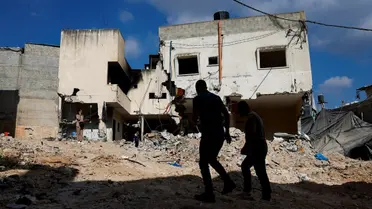In the ongoing Israeli-Palestinian conflict, the Israeli military has announced the killing of a local Hamas commander in the West Bank. This operation marks a notable escalation in the region, highlighting the persistent tensions and the complex dynamics at play. The targeting of a Hamas commander underscores Israel’s continued focus on combating what it perceives as security threats in the occupied territories, while simultaneously raising concerns about the potential for further violence and instability in the area.
Intensified Military Operations in the West Bank
The Israeli forces have been conducting a major operation in the occupied West Bank for the third consecutive day, concentrating their efforts on the volatile cities of Jenin and Tulkarm. This large-scale operation involves hundreds of troops and police, backed by advanced military hardware including armored personnel carriers, helicopters, and drones. The use of such substantial force indicates the seriousness with which Israel is approaching what it sees as a growing security challenge in the region.
In Jenin, a flashpoint city known for its resistance against Israeli occupation, Border Police forces successfully targeted and killed Wassem Hazem, who the Israeli military identified as the head of Hamas in the area. The operation also resulted in the deaths of two other Hamas gunmen who attempted to escape from the same vehicle. The Israeli military claims that weapons, explosives, and large sums of cash were discovered in the vehicle, suggesting a significant blow to Hamas’s operations in the area.
Hamas Commander: A Key Target in the Conflict
The killing of the Hamas commander in Jenin represents a critical moment in the ongoing conflict. Israel has long viewed Hamas, which controls the Gaza Strip, as a major threat to its security. By targeting a high-ranking Hamas official in the West Bank, Israel is sending a clear message about its determination to prevent the group from establishing a stronger foothold in the territory.
The Israeli military asserts that Wassem Hazem was involved in shooting and bombing attacks in the Palestinian territory. This claim, if accurate, would justify the operation from Israel’s perspective as a necessary action to protect its citizens. However, the targeting of Palestinian leaders, especially in densely populated areas, often leads to increased tensions and the potential for retaliatory actions.
Regional Implications
The current escalation in the West Bank cannot be viewed in isolation. It takes place against the backdrop of ongoing conflicts in multiple fronts. The Gaza Strip, where fighting between Israeli forces and Hamas militants has been raging for nearly 11 months, remains a major flashpoint. Additionally, clashes with the Iranian-backed Hezbollah movement along the Israel-Lebanon border have intensified, creating a complex web of regional tensions.
Since the Hamas attack on Israel in October 2023 that triggered the Gaza war, the situation in the West Bank has deteriorated significantly. Over 660 Palestinians, including both combatants and civilians, have been killed in the territory. These deaths have been attributed to actions by Israeli troops as well as attacks by Jewish settlers on Palestinian communities.
Israel contends that Iran provides weapons and support to militant factions in the West Bank, which has led to an increase in military operations in the area. This claim of Iranian involvement adds another layer of complexity to the situation, potentially widening the scope of the conflict beyond the immediate Israeli-Palestinian dynamic.
International Reactions and Humanitarian Concerns
The intensification of Israeli operations in the West Bank has not gone unnoticed by the international community. The British government, for instance, has expressed deep concern over Israel’s methods and the reports of civilian casualties. While acknowledging Israel’s need to defend itself against security threats, the UK has called for an urgent de-escalation, highlighting the worrying reports of civilian casualties and destruction of civilian infrastructure.
These concerns reflect a broader international apprehension about the humanitarian impact of the ongoing conflict. The use of heavy military equipment in densely populated areas raises the risk of civilian casualties and damage to essential infrastructure, potentially exacerbating the already difficult living conditions for Palestinians in the occupied territories.
The killing of a Hamas commander in the West Bank by Israeli forces marks a significant moment in the long-standing conflict between Israel and Palestinian militant groups. While Israel views such operations as necessary for its security, the potential for escalation and further violence remains high. As the situation continues to evolve, the international community watches closely, calling for restraint and a return to dialogue. The coming days and weeks will be crucial in determining whether this latest operation leads to a broader conflict or if cooler heads can prevail in the interest of regional stability and civilian safety.
Related News
















